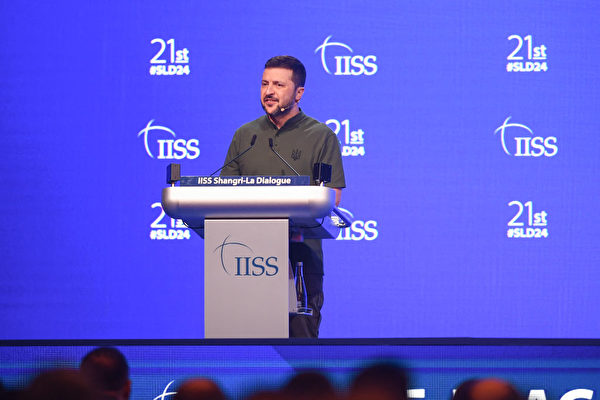News Analysis
Ukrainian President Volodymyr Zelenskyy recently accused Beijing of acting as Moscow’s instrument in supporting Russia’s war on Ukraine and disrupting an upcoming peace summit.
During a meeting in Singapore on June 2, President Zelenskyy criticized the Chinese Communist Party (CCP), marking the first time he has directly accused the regime of helping Russia.
“Regrettably, this is unfortunate that such a big, independent, powerful country as China is an instrument in the hands of Putin,” he said.
“That is not only support to Russia, that is basically support of war.”
The summit, proposed by Ukraine, is set for June 15 and 16 in Switzerland. The CCP has said it won’t go because Russia was not invited.
On June 4, Chinese Foreign Minister Wang Yi and Turkish Foreign Minister Hakan Fidan held a joint press conference in Beijing.
Mr. Wang said that a “six-point consensus” to resolve the Russia–Ukraine war, which was proposed by the CCP and Brazil, meets the expectations of most countries and that its contents have been affirmed by Russia and Ukraine.
He said China hopes that more countries will support the “six-point consensus,” which Mr. Fidan also welcomed.
The Ukraine ministry criticized the “high-ranking Chinese official” and said China’s presence at the summit would be a “significant signal of China’s balanced position,” after its four leader summits with Russia since the beginning of the war.
According to President Zelenskyy’s office, Kyiv sent invitations to about 160 governments and organizations. As of early June, 107 had indicated their participation.
Tang Jingyuan, a senior China affairs commentator, believes the CPP is snubbing the summit because the core plan is unacceptable to Russia and China.
Mr. Tang also said it’s possible President Putin, while in China recently. asked Xi Jinping not to participate.
The summit will isolate Russia and China even more, he predicts.
“For these reasons, the CCP does not attend the summit itself and is trying to prevent other countries from attending,” he told Epoch Times on June 8.
“This peace summit will also discuss important issues such as nuclear safety, food safety, and the return of Ukrainian children kidnapped by Russia, all of which are tough issues that the CCP is afraid or unwilling to face.”
CCP’s Diplomatic Relations With Ukraine
Communist China formed diplomatic relations with Ukraine in 1992. Until the outbreak of the Russia–Ukraine War, the two had a relatively good relationship.
In that agreement, China affirmed its commitment to providing security assurance to Ukraine, which stated that “no Party to the Treaty shall allow a third State to use its territory to undermine the national sovereignty, security or territorial integrity of the other Party.”
At the time, Ukraine’s military strength was much stronger than that of the CCP. Moreover, both the United States and Russia had imposed an arms blockade and embargo on the CCP. Ukraine sold almost all its assets inherited from the Soviet Union to the CCP, helping it to rapidly develop military power and complete military equipment.

In the international arena, the CCP endorsed Russia and used all available diplomatic means to oppose international sanctions against the latter, saying that “sanctions have never been a fundamentally effective way to solve problems.”
In April 2023, Xi and President Zelenskyy spoke for the first time since the war began in February 2022. By comparison, Xi had spoken to President Putin five times since the start of the invasion.
In his speech in Singapore, President Zelenskyy also said that Ukraine had repeatedly tried to meet with Chinese representatives, including Xi, but had been turned down.
Mr. Tang said this is not the first time that Xi has reneged on his promises.
Xi also pledged not to militarize the islands in the South China Sea and to uphold the current situation in the Taiwan Strait.
“The CCP’s abandonment of Ukraine does not come as a surprise,” he remarked.
“Despite the CCP’s past commitments to the international community and its claims of aligning with global interests, these assurances are not to be trusted.”







